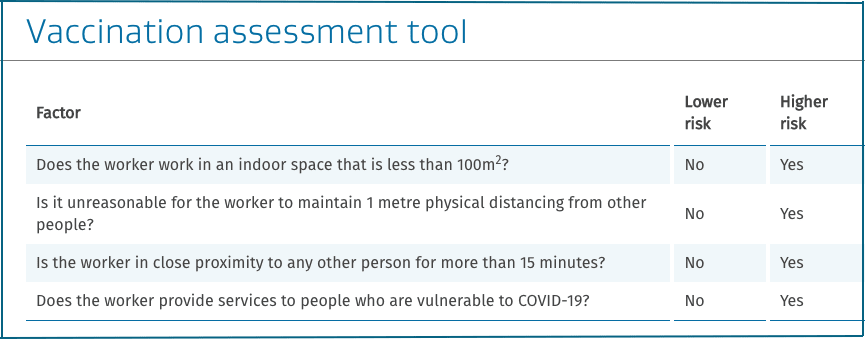
Many employees – and their bosses – would like to see a vaccine mandate at their workplace. No jab, no job. But it’s not that simple.
Just before Christmas, Fletcher Building’s chief executive Ross Taylor made an announcement. From February 15 all employees – whether they work on a construction site, in a warehouse, a store, if they drive a truck, or even work from home – must be fully vaccinated against Covid-19.
No jab, no job, no exceptions.
It was a popular move in the company, Taylor said. Extensive employee consultation had found the vast majority of staff supported requiring vaccinations at work.
“The feedback agreed that the best way for us to ensure our workplace is as safe as possible and to protect each other, is for everyone to be fully vaccinated.”
But it was also a brave move, with Fletcher Building one of the first New Zealand companies – certainly the biggest one – to implement a blanket ban on unvaccinated employees, no matter where in the organisation they worked.

The move will affect around 9000 people, and it's hard to imagine there won't be job losses – and possibly backlash.
Other companies have come up with a variety of different solutions to the vaccine mandate problem.
Several professional services firms – lawyers Bell Gully and Russell McVeagh and accountants PwC, for example – have stopped unvaccinated employees coming into the office, but allowed working from home.
The Warehouse Group mandated vaccination for anyone working in stores; Foodstuffs says staff in head office, distribution centres and transport depots have to be jabbed, but following disagreement with store owners, individual member stores can make their own decision on staff vaccinations.
Sealord has gone for a totally different approach – setting an 85 percent vaccination rate by area in the company. So, for example, 85 percent of crew on a fishing vessel, or workers in a fish plant, or people in an office need to be vaccinated on any shift, Sealord chief executive Doug Paulin told Newsroom.
“We believe this allows us to offer a safe working environment which protects our people, but also gives some recognition to the fact people are able to choose whether to be vaccinated or not.
“Everyone has until January 24 to indicate if they are going to get one jab, if their area is under 85 percent.”
Sealord will also test staff weekly across the company, and use mask wearing and distancing measures.
Paulin believes a full ban on unvaccinated workers would have been totally legal – and simpler to implement. It was also the most popular option for management. But he says he understands staff members’ wish for choice.
“It’s complicated.”
Certainly is. Companies are left trying to work out a balance between their moral and legal requirements to ensure the safety of staff (and often customers and suppliers) and the various legal protections people have against being forced to have a jab, being dismissed unfairly, and being discriminated against.
What the law says
Meanwhile the law around vaccine mandates is changing – and is pretty much untested.
The most recent – and most relevant piece of legislation is the snappily-named “COVID-19 Public Health Response (Vaccination Assessment Tool) Regulations 2021”.
Announced on December 13, the day before Ross Taylor made his announcement, and coming into law the day after, the new rules bring much more clarity around what risk factors companies should be looking at when considering whether to make vaccinations compulsory.
The assessment tool asks four questions (see below) and if an organisation answers “yes” to at least three the Government judges it “would be reasonable to require vaccination for workers who carry out that work”.

But there’s the rub – the questions aren't about companies or even work sites, they are about individual jobs or roles.
And there are strict human rights criteria which came out of the hideous medical experiments performed by Nazi doctors during World War II and protect people from being forced to have a medical procedure. Meanwhile anti-discrimination legislation seeks to stop companies discriminating against people with certain religious or ethical beliefs.
“If a worker doesn’t want to be vaccinated, but the tool indicates it is reasonable to require vaccination for their work, or part of their role, then you must comply with your employment law obligations, eg act in good faith and consider any reasonable alternative employment arrangements or redeployment, or other measures that may minimise risk,” according to an explainer about the new rules on the Government’s small business information website Business.govt.nz.
Karina McLuskie is a senior associate at law firm Tompkins Wake. She says companies need to be careful with blanket vaccination mandates.
“Organisations have to go through a risk assessment on a role-by-role basis, to decide if a mandate is appropriate.

“The legislation says before you look at dismissing someone you have to look at all reasonable alternatives.”
It might be that a company decides someone working from home – or in a shielded part of an office – long term isn’t appropriate. But maybe it’s fine.
Limited court rulings
So far the very limited court judgements have tended to come down on the side of the vaccine mandators.
In September last year the Employment Relations Authority threw out a case from a Customs NZ worker dismissed from her job for refusing to get vaccinated. However this case involved a Government-mandated public health order making vaccination compulsory for people working at the border and in managed isolation facilities, so doesn't necessarily help guide companies trying to come up with policies outside these health orders.
Meanwhile, a landmark case in Australia in December found a vaccine “site access requirement” introduced by mining and energy company BHP wasn’t unlawful, although the company failed to consult properly with employees.
“In providing relief for employers, the [judges] accepted that there were considerations weighing in favour of a finding that the Site Access Requirement was reasonable,” a commentary from Australian law firm Cooper Grace Ward says. “This included that it was directed at ensuring the health and safety of workers, and that it was a reasonably proportionate response to the risk created by COVID-19.
“The Full Bench remarked that if BHP had fulfilled its consultation obligations, these considerations would have provided a ‘strong case in favour of a conclusion that the Site Access Requirement was a reasonable direction’.”
Times have changed
As with so many things around Covid, the rules are changing fast. Back last year the general opinion was vaccine mandates were likely to be the exception, rather than the rule.
“Our view is that in most circumstances it will not be lawful for employers to make vaccination compulsory for employees without also contemplating exceptions or carve outs to any compulsion, as appropriate,” wrote Russell McVeagh employment law expert Kylie Dunn early in 2021.
“Strong employer support for vaccination is lawful. Making vaccination compulsory for employees may not be lawful unless an employer indicates a willingness to consider exceptions.”

Things have changed since then, Dunn says. The arrival of the Delta and Omicron variants, for example, and a much more widespread acceptance of vaccine mandates in the community. The majority of New Zealanders appear to be pretty accepting of showing their Covid pass to get into a cafe, or the movies.
But the legal risks to businesses of enforcing workplace vaccination mandates are still there. Dunn says company bosses she is working with are having to make difficult decisions around possible mandates.
“Everyone is trying to do the right thing, but it’s not super clear what the right thing is medically or legally. The cases so far have been around Government health order-mandated vaccines, so they are not super-helpful.”
She says the closest parallel is around compulsory drug and alcohol testing in the workplace. While some companies have tried to introduce random across-the-board testing, the courts have made a strong distinction between positions which are safety-sensitive and those which aren’t.
Air New Zealand is allowed to randomly drug test its pilots, for example, but not its accountants.
That same principle could potentially see rulings against blanket vaccination mandates.
Lawyer Karina McLuskie predicts a few more lawsuits this year.
“We will see more action coming from employees around these mandates. In Australia there has been surge of cases, so it’s likely we’ll see more cases here too.”
‘Confident and comfortable’ in our approach
Meanwhile, a Fletcher Building spokesperson says the company believes its blanket mandate won't get it into legal trouble, but each company needs to make its own decision.
"We are confident and comfortable in the approach we took, including with our risk assessment to arrive at our decision to introduce a vaccine mandate. Every individual company needs to undertake their own risk assessment and get advice as it pertains to their own business and circumstances. Having a genuine and open engagement with their people is also fundamental."
The spokesperson says there are health and safety implications for employees, even when unvaccinated staff are in roles where they are able to work from home.
"The risk assessment we undertook is based on the fact that everyone will need to come to the office at some time for different things – for example teamwork, learning and development etc – and we want everyone to be safe when this happens."







